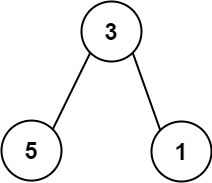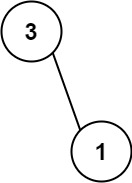Path sum iv
class Solution:
def __init__(self):
self.ans = 0
def solve(self, d, depth, pos, res):
left = pos * 2 - 1
right = pos * 2
if depth + 1 not in d:
self.ans += res + d[depth][pos]
return
if left not in d[depth + 1] and right not in d[depth + 1]:
self.ans += res + d[depth][pos]
return
if left in d[depth + 1]:
self.solve(d, depth + 1, left, res + d[depth][pos])
if right in d[depth + 1]:
self.solve(d, depth + 1, right, res + d[depth][pos])
def pathSum(self, nums: List[int]) -> int:
tree = {}
for i in range(len(nums)):
node = str(nums[i])
level = int(node[0])
pos = int(node[1])
val = int(node[2])
if level not in tree:
tree[level] = {}
tree[level][pos] = val
self.solve(tree, 1, 1, 0)
return self.ans
Path Sum IV
If the depth of a tree is smaller than 5, then this tree can be represented by an array of three-digit integers. For each integer in this array:
- The hundreds digit represents the depth
dof this node where1 <= d <= 4. - The tens digit represents the position
pof this node in the level it belongs to where1 <= p <= 8. The position is the same as that in a full binary tree. - The units digit represents the value
vof this node where0 <= v <= 9.
Given an array of ascending three-digit integers nums representing a binary tree with a depth smaller than 5, return the sum of all paths from the root towards the leaves.
It is guaranteed that the given array represents a valid connected binary tree.
Example 1:

Input: nums = [113,215,221] Output: 12 Explanation: The tree that the list represents is shown. The path sum is (3 + 5) + (3 + 1) = 12.
Example 2:

Input: nums = [113,221] Output: 4 Explanation: The tree that the list represents is shown. The path sum is (3 + 1) = 4.
Constraints:
1 <= nums.length <= 15110 <= nums[i] <= 489numsrepresents a valid binary tree with depth less than5.
